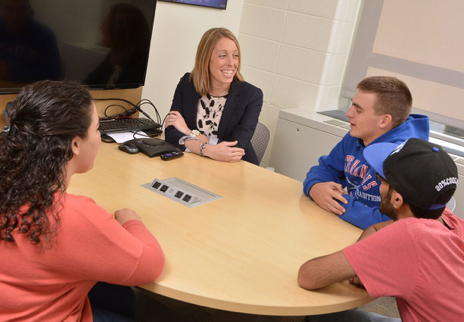Blog Entries
The Graduate School Grind: Key Tips for Starting Your Journey
Graduate school is a large step for many students, and can seem quite daunting to the undergraduate junior or senior.
As a prospective graduate student myself, I have had my fair share of stress over such a decision, especially on how to start the college search. Below I would like to share what I have learned about how to best prepare for the next step in your professional development and ease the anxiety over graduate school.
1. Put Language to What You Like
As a biology major, there are many different options for graduate programs, ranging from medical school to biostatistics, and various other fields that I may not know. It is important to sit down with someone, whether this be an advisor, a faculty member you trust, or even a friend and describe to them what you like. They may be able to help you define the field of study you want to pursue. For example, I recently met with my advisor and listed my love of data analysis, 3D printing, and biology, and he told me a field to look into: computational bioengineering.
2. Start Learning About Your Field of Study
After defining what you want to study, it is important to learn what it entails. Although you may be pursuing a graduate degree with the same title as your undergraduate degree, there may be significant differences. The best way to learn about field specifics is to talk to professionals in your field. This may be faculty at your University, but it can extend beyond the borders of your institution. Remember that faculty often have connections at other schools as well! It may be best to reach out to a faculty member’s friend or colleague to learn more about a particular program. You can also access information from the Career Development Center, including DSU Mentor. This program lets you meet with a DeSales Alumni and learn from them about their journey, what to expect, and much more. You can also access information from alumni by listening to the Career Center’s podcast Beyond the Tassel.
3. Do Your General Research!
Now that you know more about your field, it's time to start looking at the best places to attend. This includes a variety of factors, including the status of the school (is it well known?), the cost, commitment, benefits, location, and much more! It is essentially a more in-depth undergraduate college search. Although daunting, there are tons of places you can look for information, whether this be advice from faculty or Graduate School Guides that can be found in the Career Development Center. If you want more help, don’t be afraid to ask members of the Career Development Center! During the process, you can also email admissions counselors at the University of interest with questions. This approach not only gets you information, but allows you to be noticed by the University.
4. Do Your Field-Specific Research!
Depending on your area of study, there can be a slew of other factors to investigate for graduate school. Sometimes, it is important to consider specific faculty you may be working with, or whether the school’s facilities are conducive to your future goals. For science majors especially, research is a crucial part of any graduate program. With this in mind, not only are concepts like school cost and rigor important, but the faculty with whom you may wish to do research is important as well. Take a look at the faculty at the program you are interested in, pick one you like, and take a moment to read through some of their research and interests. Ultimately, you are not just applying for a school, but applying to a laboratory position.
5. Develop Your Elevator Pitch
We are almost at the end of our list of tips! Before that, you must develop what we call at the Career Center your “elevator pitch.” This brief self-introduction is a boiled-down summary of your career goals and past experiences. By forming a quick and effective “pitch” of yourself, you will be able to demonstrate to people you may meet a general idea of who you are in a clear way. From there, your new acquaintance can determine if they wish to learn more. It is also handy to have an elevator pitch in case you meet any professionals along your career path.
6. Reach Out!
Finally, in your journey towards graduate school, it is important to reach out to faculty at the program you like and get to know them--especially for any research based programs. Using the information you learned from doing your specific research, you can employ your elevator pitch and contact faculty, explain to them your interest in their school, their research, and that you would like to meet them and learn more about what they do. This initiative serves many purposes. For one, it ensures that you have a good fit at a University and like what they do. It also sets you apart from others applying to the same program. Although faculty like students with good grades, academic prowess is not the only factor. It would be far better for faculty to have a student who is dedicated and involved in the lab over one that only has good grades. So, set yourself apart by reaching out and showing your dedication!
With these steps, you’ll be on the right track to attending the graduate school of your dreams!


Follow Career Development Center on Social
CDC on Facebook
Stay up to date with Career Development Center's posts on Facebook.
CDC on LinkedIn
See the latest posts on LinkedIn by the Career Development Center. Follow them on LinkedIn.
CDC on Instagram
See the latest posts on Instagram by Career Development Center.




